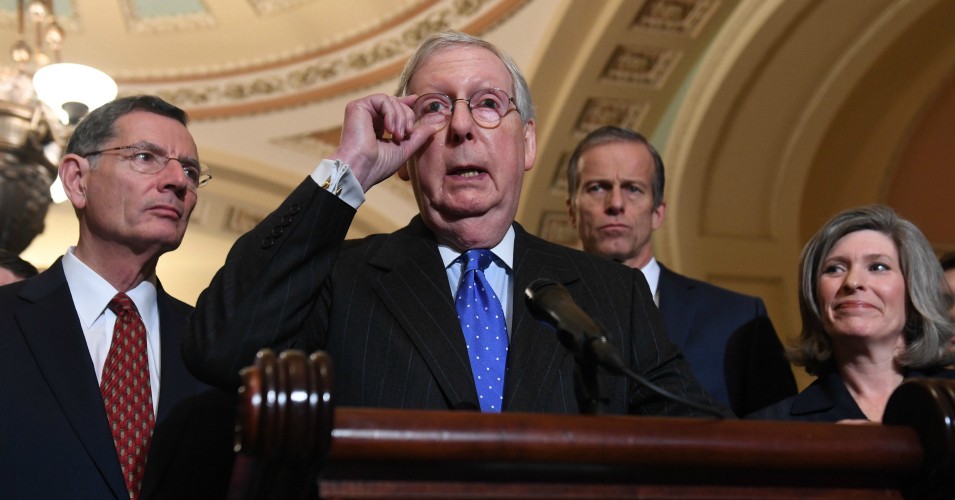Featured
Why Isn’t the Senate Having Witnesses During the Impeachment Trial?

On Dec 18, the US House of Representatives impeached President Donald J. Trump for high crimes and misdemeanors. Now – or when the House releases the charges, the Senate must set the rules for a trial and hold court to determine whether the 45th President of the United States should be removed from office. For only the third time in the 243 years of our republic, Senators are jurors in a trial presided over by the Chief Justice of the US Supreme Court.
In this historic moment, it’s time to ask Senators some important questions. At the top of the list: Who are you representing in the Senate trial?
Let’s be clear: Senators are not the Secret Service protecting the president. The Secret Service is doing a fine job. We don’t need that. The Senate’s job is to establish the rules for conducting a trial, then act as the jury to determine guilt or innocence.
In the last two impeachments, the answer has been simple: Senators represent us. In Trump’s world, Republican Senators seem to be representing the president.
Senate Majority Leader Mitch McConnell, R-Ky., already announced that “I’m not an impartial juror. This is a political process. There’s nothing judicial about it. Impeachment is a political decision. I’m not impartial about this at all.” And Sen. Lindsay Graham, R-SC, said, “I am trying to give a pretty clear signal I have made up my mind. I’m not trying to pretend to be a fair juror here.”
Wow, what a blow to democracy! Where to begin with the fact checking?
First and foremost, the impeachment inquiry is a criminal proceeding. Acting as a grand jury, the House investigation began with the whistleblower complaint, witnesses testified and evidence was presented. Solid additional evidence of wrongdoing was uncovered.
Based on testimony presented to Congress by Trump appointees, investigators found that Trump held up $391 million in congressionally approved aid for Ukraine to fight Russian aggression. The Pentagon confirmed that $35 million of the monies for our ally was never distributed. Military assistance and a White House visit for the President of Ukraine was conditioned on an investigation of a political opponent of Trump and 2016 election interference. That’s an abuse of power, the first charge otherwise known as an Article of Impeachment.
Trump ordered everyone to defy subpoenas issued as part of the House investigation. Pat A. Cipollone, White House counsel, stated in an Oct 8 letter to House leaders that “President Trump and his Administration cannot participate in your partisan and unconstitutional inquiry under these circumstances.” That’s obstruction of Congress, the second Article of Impeachment.
Both charges are criminal offenses for an elected official.
As is the case in all criminal proceedings, jurors swear to be impartial. Senators must take a special oath of impeachment. In criminal courts, jurors who can’t be impartial are recused and not allowed to serve. But the Senate makes its own rules.
As the first Black woman to serve as Chief of the Orlando Police Department, Rep. Val Demings, D-Fla., knows our criminal justice system. She pointed out the conflict with McConnell’s statement:
“No court in the country would allow a member of the jury to also serve as the accused’s defense attorney. The moment Senator McConnell takes the oath of impartiality required by the Constitution, he will be in violation of that oath. He has effectively promised to let President Trump manage his own impeachment trial.”
It is even harder to imagine another trial in the nation where jurors decide innocence or guilt based on no witnesses. McConnellhas no plans to allow witnesses for either side in a so-called Senate trial.
Ideally both sides should have witnesses and evidence to make their case. It’s one thing in the House for witnesses to refuse to testify. A defendant has the right to be silent.
However, McConnell, supported by all Republican Senators, has decided to allow NO witnesses at all. Some are asking: What’s the big deal? We already heard witnesses. Why do we need to hear witnesses again?
In the impeachment process, like a criminal trial, there are two types of witnesses. First, witnesses provide evidence in the grand jury investigation. The testimony in the House helped congressional investigators decide whether to bring charges. Second, witnesses in a trial in the Senate provide evidence to support or refute the charges. As in a criminal trial, both the prosecutor and defendant can bring evidence.
Would you want the court in a trial involving your son or daughter to decide their fate with no witnesses?
Senators must decide the innocence or guilt of the President of the United States based on their opinions. Who would support this kind of trial?
Most voters want witnesses to testify. According to an ABC News and Washington Post poll, “about 7 in 10 Americans think the administration officials should be able to testify.”
Find out where your Senator stands. Is your Senator representing their party or Trump? Where do you stand?
Our democracy depends on checking power and balancing it. We are the only ones who can hold elected officials accountable.

-

 Featured10 months ago
Featured10 months agoCalifornia Is the First State to Create A Public Alert for Missing Black Youth
-

 Featured10 months ago
Featured10 months agoAfrican American Leaders Stay the Course Amid Calls for President Biden To Bow Out of Race
-

 Featured10 months ago
Featured10 months agoThe Debate Fallout Lands on Both Candidates
-

 Featured9 months ago
Featured9 months agoPresident Joe Biden Decides to Withdraw from the Presidential Race
-

 Featured9 months ago
Featured9 months agoIn One of His Final Speeches as President, Biden Says It’s Time for ‘Fresh Voices’
-

 Featured10 months ago
Featured10 months agoPresident Joe Biden Describes Shooting of Donald Trump As ‘Sick’









